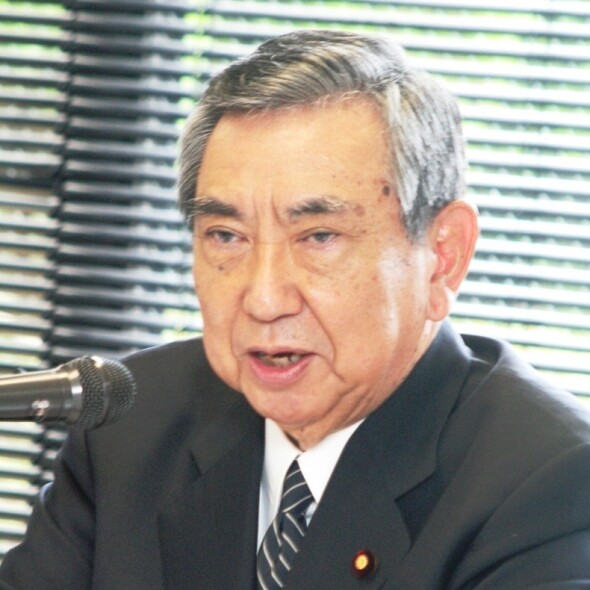hankyoreh
Links to other country sites 다른 나라 사이트 링크
Prominent Japanese says don’t deny guilt with comfort women

By Jeong Nam-ku, Tokyo correspondent
Yohei Kono, the former Japanese Chief Cabinet Secretary who in 1993 acknowledged and apologized for the forcible drafting of so-called “comfort women” as sexual slaves to the Japanese military, issued a stern warning on Oct. 8 against the country’s continued denials.
Kono said the country could “lose national credibility” if it continues denying the coercion involved in the women’s mobilization.
In an interview with the editor of the Yomiuri Shimbun’s “Witness to History” column, Kono said his 1993 statement reflected the determination of then-prime minister Kiichi Miyazawa’s cabinet following close examination of materials from South Korea, Japan, and the US National Archives.
“It was not adopted as a Cabinet meeting decision, but all subsequent Japanese Cabinets abided by it,” he added.
Kono said he felt “saddened to hear people arguing for over half a century after the war as though these suffering women and their wartime tragedy never existed, pointing to the lack of documentary evidence.”
He added that if Japan continues denying the issue, it “may end up having its human rights position and national credibility called into question not only in Asia but in the nations of America and Europe.”
In the interview, Kono explained the process of deciding the statement’s content. After his predecessor, Koichi Kato, stated in July 1992 that an investigation had found no documentary evidence to confirm the forcible nature of the comfort women’s mobilization, Kono asked the police, defense ministry, foreign ministry, and other agencies to reopen the investigation.
Finally, sixteen survivors were interviewed directly, Kono recounted. The accounts indicated that the Japanese military either threatened the women into going along or misleadingly told them that they would be working at factories.
“Some of them testified that women had to service 20 or more soldiers a day, and that they were abandoned when the Japanese forces were routed,” he added.
According to Kono, it was determined that the accounts should be viewed on the whole as indicating coercion, since the women were not in a position to defy the Japanese military.
He also recalled that Miyazawa expressed shock upon reading the women‘s testimony.
Analysts saw Kono’s interview as expressing his profound concern about denials of the forcible mobilization by prominent political figures like Osaka mayor and Japan Restoration Party chief Toru Hashimoto. Former Prime Minister Shinzo Abe said during his recent successful campaign for the Liberal Democratic Party chairmanship that he would “revise” Kono’s statement if his party comes to power.
Please direct questions or comments to [english@hani.co.kr]

Editorial・opinion
![[Editorial] Penalties for airing allegations against Korea’s first lady endanger free press [Editorial] Penalties for airing allegations against Korea’s first lady endanger free press](https://flexible.img.hani.co.kr/flexible/normal/500/300/imgdb/original/2024/0502/1817146398095106.jpg) [Editorial] Penalties for airing allegations against Korea’s first lady endanger free press
[Editorial] Penalties for airing allegations against Korea’s first lady endanger free press![[Editorial] Yoon must halt procurement of SM-3 interceptor missiles [Editorial] Yoon must halt procurement of SM-3 interceptor missiles](https://flexible.img.hani.co.kr/flexible/normal/500/300/imgdb/child/2024/0501/17145495551605_1717145495195344.jpg) [Editorial] Yoon must halt procurement of SM-3 interceptor missiles
[Editorial] Yoon must halt procurement of SM-3 interceptor missiles- [Guest essay] Maybe Korea’s rapid population decline is an opportunity, not a crisis
- [Column] Can Yoon steer diplomacy with Russia, China back on track?
- [Column] Season 2 of special prosecutor probe may be coming to Korea soon
- [Column] Park Geun-hye déjà vu in Yoon Suk-yeol
- [Editorial] New weight of N. Korea’s nuclear threats makes dialogue all the more urgent
- [Guest essay] The real reason Korea’s new right wants to dub Rhee a founding father
- [Column] ‘Choson’: Is it time we start referring to N. Korea in its own terms?
- [Editorial] Japan’s rewriting of history with Korea has gone too far
Most viewed articles
- 1Months and months of overdue wages are pushing migrant workers in Korea into debt
- 2[Editorial] Penalties for airing allegations against Korea’s first lady endanger free press
- 3Bills for Itaewon crush inquiry, special counsel probe into Marine’s death pass National Assembly
- 4[Reporter’s notebook] In Min’s world, she’s the artist — and NewJeans is her art
- 560% of young Koreans see no need to have kids after marriage
- 6S. Korea discusses participation in defense development with AUKUS alliance
- 7Trump asks why US would defend Korea, hints at hiking Seoul’s defense cost burden
- 81 in 3 S. Korean security experts support nuclear armament, CSIS finds
- 9Korean firms cut costs, work overtime amid global economic uncertainties
- 10[Guest essay] Maybe Korea’s rapid population decline is an opportunity, not a crisis